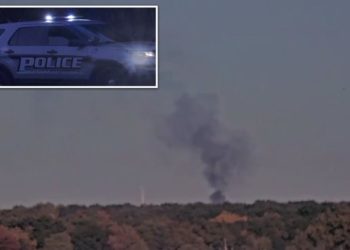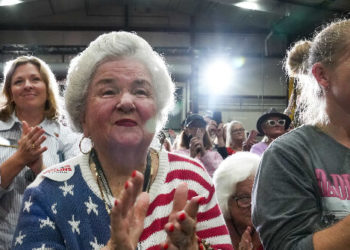Amy Kane was filled with dread when she heard that the national suicide prevention lifeline would stop offering specialized crisis intervention to young LGBTQ+ Americans and end its partnership with the West Hollywood-based Trevor Project.
With the service set to end July 17, Kane, a therapist who identifies as lesbian, believes the Trump administration is sending a clear message to queer Americans: “We don’t care whether you live or die.”
Since it launched in 2022, more than 1.3 million queer young Americans struggling with a mental health crisis have dialed the 988 Suicide and Crisis Lifeline, which gave them the option to press “3” to connect with a specialist trained to address their unique life experiences. As the largest of seven LGBTQ+ contractors, the Trevor Project alone handles about half of all volume from queer callers to the 988 line.
The government’s decision is yet another broadside from an administration whose actions have left queer public health advocates and providers reeling, including at the Los Angeles LGBTQ Center, where Kane serves as director of mental health services.
Under pressure from the Trump administration, Children’s Hospital Los Angeles sent letters to families in early June saying it planned to suspend its healthcare program for transgender children and young adults in late July. The LGBTQ Center and other groups have demanded that the hospital reconsider.
Around the same time came the news about the 988 line and the Trevor Project, a nonprofit founded in 1998 by the makers of the Academy Award-winning short film “Trevor” — about a teen who attempts suicide — to address the absence of a major prevention network tailored to the needs of queer youth.
“So much has been thrown our way in the last five months,” Kane said. “It’s across the board. It’s not just mental health. We see what’s happening with gender-affirming care, dramatic cuts in research for HIV and STIs. … What’s next?”
Given L.A.’s status as a haven for LGBTQ+ people — the first permitted Pride parade took place in Hollywood in 1970 — Kane wonders whether the recent moves are an attempt to intimidate and punish Californians for being so welcoming.
The threats aren’t just coming from Washington. Kane said that she and other leaders had to lobby state legislators recently to preserve funding for a queer women’s preventive-healthcare program offered through the L.A. LGBTQ Center that was to be revoked due to a state budget shortfall. For now, the program has been given a temporary reprieve.
“It used to be this idea of, ‘Oh yeah, that’s in the red states, but I’m safe in California’ — it doesn’t feel that way anymore,” Kane said.
Staff at the Trevor Project scrambling to figure out how to save the jobs of about 200 counselors who are paid through the federal contract, including raising private funds to make up for the unexpected shortfall, said Mark Henson, interim vice president of advocacy and government affairs. The news couldn’t come at a worse time, given that calls nationwide are on pace to top 700,000 in 2025. That’s up from 600,000 in 2024, a spokesperson said, citing metrics from the U.S. Substance Abuse and Mental Health Services Administration.
Another 100 crisis counselors are employed and paid separately by the Trevor Project itself. They will continue taking calls through the project’s own 24/7, free crisis line, one of several options that local LGBTQ+ organizations offer. Los Angeles County’s Alternative Crisis Response has a 24/7 helpline at (800) 854-7771 that also provides culturally sensitive support services.
But Alex Boyd, the Trevor Project’s director of crisis intervention, said he isn’t sure how his organization can make up for the loss of the nationwide visibility and federal support that the 988 partnership affords them.
LGBTQ+ young people are more than four times as likely to attempt suicide than their peers, according to the Trevor Project. Its 2024 survey found that in California, 35% of LGBTQ+ young people seriously considered taking their own lives and that 11% of respondents had attempted suicide in the previous year.
In defending the decision to stop working with the Trevor Project at a House budget hearing in May, Health and Human Services Secretary Robert F. Kennedy Jr. said that while Trump supports the 988 Suicide & Crisis Lifeline in general, “We don’t want to isolate different demographics and polarize our country.”
The big question, Boyd said, is will young LGBTQ+ Americans who already feel shunned or misunderstood still trust a suicide prevention line that no longer offers counselors they can easily relate to?
A one-size-fits-all approach doesn’t work when it comes to people in emotional and mental distress, Boyd said.
He fears the worst.
“The fact that such a significant amount of our capacity for impact has now been stripped away — there is no operational way in order to navigate through a moment like this that doesn’t result, in at least the short term, in a loss of life.”
Counselors at the Trevor Project hear the anguish over the anti-LGBTQ+ backlash in the voices of young callers seeking help through the lifeline, Boyd said. “The statements we are hearing are: ‘Our government doesn’t support me. The government is actively erasing my experience from the national conversation.’ ”
“Increasingly, the biggest thread that we see from young people reaching out to us is this idea that it is already difficult to be a young person in the world — this is another layer that we’re adding onto children’s lives,” Boyd said. “They’re coming to us saying they’re not sure how they’re going to be able to navigate through more years of this before they get some level of autonomy and agency and find some sense of safety.”
Along with a host of executive actions signed by the president, thousands of bills targeting the LGBTQ+ community have been introduced in state legislatures, in cities and in school districts in California and around the country, including calls to ban books that mention same-sex relationships and gender identity, remove the Pride flag from government buildings and kick trans athletes off of sports teams.
Adding to the strain on the queer community, Trump’s self-described “Big Beautiful Bill,” recently passed in both houses in Congress, cuts public health funding for low-income Americans who receive Medicaid. LGBTQ+ Americans are twice as likely to rely on Medicaid to receive their health care than other Americans, said Alexandra Curd, a staff policy attorney at the national advocacy group Lambda Legal.
Over 40% of nonelderly U.S. adults living with HIV depend on the federal program for their healthcare needs compared to 15% for the general population, according to KFF. Many recipients rely nonprofit organizations funded by federal grants to get HIV and STI screenings and receive HIV prevention medications such as PREP and PEP, Curd said.
Because of the Medicaid cuts and the prospect of increased difficulty in accessing preventive care and emotional support, “We’re going to possibly be seeing rising infections rates for HIV,” she said.
Curd said a recent spike in HIV rates among Latino men could only worsen. The Centers for Disease Control and Prevention officials have cited a lack of adequate funding, racial bias, language barriers and mistrust of the medical system among the reasons that gay and bisexual Latino men account for a disproportionate percentage of new HIV cases.
Lambda Legal’s help desk has already received more requests for assistance with health care, employment and housing discrimination in the first half of 2025 than in all of 2024, with the most pressing need coming from trans and nonbinary callers.
One piece of good news for L.A. came recently when Rep. Laura Friedman (D–West Hollywood) announced that the Trump administration had restored more than $19 million in federal grants for HIV and STI prevention and tracking that were earmarked for the L.A. County Department of Public Health but slashed by the CDC. Friedman said she and others spoke out against the cut were able to secure an extra $338,019 in federal funding for the new fiscal year starting June 1.
But it’s hard for healthcare organizations to celebrate given that vital funds for mental health and HIV programs were targeted in the first place.
Manny Zermeño, a behavioral health specialist at the Long Beach office of another queer community service organization, APLA Health, senses the distress in his clients. “There is fear, sadness and also with those feelings, it’s natural to have some anger and confusion,” Zermeño said.
The L.A.-based nonprofit focuses on providing free and affordable dental, medical, counseling and other services for queer people 18 and over. It was founded in 1982 as AIDS Project Los Angeles. Back then, a small team of volunteers worked a telephone hotline in the closet of the Los Angeles Gay and Lesbians Community Service Center, fielding calls from panicked residents seeking answers about what was then a fatal disease for which there was no treatment.
The organization operated the first dental clinic in the U.S. catering to AIDS patients out of a trailer in West Hollywood. After movie star Rock Hudson announced he had AIDS in 1985, the organization galvanized support among Angelenos by hosting the first-ever AIDS Walk fundraiser at Paramount Studios, according to its website.
Kane and leaders of other community organizations in L.A. said they would rally once again, this time to assist the Trevor Project.
“All of us who have boots on the ground — you’ll literally have to drag us out by our ankles in order to not provide care to our community,” Kane said. “I don’t believe that queer kids will not have access to resources, because we won’t allow it.”
The post National suicide prevention hotline plans to stop offering LGBTQ+ youth counseling. Queer advocates in L.A. wonder what’s next appeared first on Los Angeles Times.




